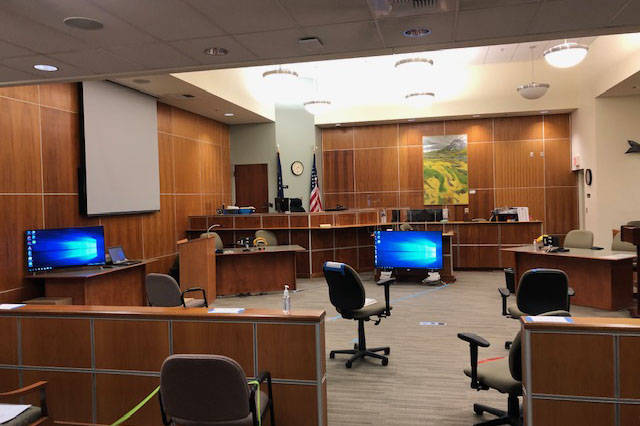The pandemic has profoundly affected how we all function … and this includes the court system. The need for safety has added layers of complexity to how court employees do their jobs. Because of their hard work, the court system has not shut its doors for a single day since the pandemic began.
What are we doing? How has public service been affected? For the first three months the court limited the scope of its hearings, giving priority to cases that most directly affect public safety. Criminal cases, for example, have been heard every day — including on weekends. Since Jan. 1, 1,431 criminal cases have been filed in the Kenai court. Another important example is child protection cases. The filing of these cases, 71 this year to date, has not been interrupted.
Since June 1 the only type of hearing that has not occurred has been jury trials. (And, it’s worth noting, that only about 2% of criminal cases resolve pursuant to trial). All other case types continue, with modifications made for safety. The court has changed its procedures to handle as many hearings as possible over the phone or via Zoom. In Kenai, between Jan. 1 and Oct. 19, we opened files for 780 civil cases, 242 probate matters, 37 juvenile delinquency cases, 65 small claims, and over 4,000 minor offense tickets. This is in addition to the hundreds of cases begun in prior years.
The court system recognizes the constitutional necessity for jury trials and, indeed, the Kenai court is holding the first criminal jury trial in the state beginning this week. Unfortunately, the old “normal” is no longer safe.
On a statewide level, the courts are working on practical solutions. Here, we picked a jury by using an extensive online questionnaire, bringing small groups of potential jurors into the courtroom at a time, and prescreening some jurors by Zoom. The courtroom has been extensively modified. All participants, including the judge, must wear a mask. The witness stand has been surrounded by plexiglass so that witnesses can remove their masks during testimony. Desks and chairs have been reconfigured for social distancing. The public has access via YouTube. Exhibits will be shared using computers and TV screens placed around the room. Jurors will be provided with gloves, sanitizers and masks. The lawyers and judge will communicate via email and other technology since they can no longer huddle at the bench. If needed, due to travel or medical restrictions, witnesses may testify by video. All in all, it has been challenging to develop new systems to provide a fair trial to both victim and the accused.
So, in answer to the question: what are we doing? The answer is everything we were doing before, while finding new ways to do it … sometimes more slowly, sometimes more efficiently, but always more safely.
Jennifer Wells is a Kenai Superior Court judge.
• Kenai Superior Court Judge Jennifer Wells

